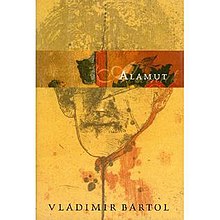Alamut (Bartol novel)

Cover of the English translation of the novel.
|
|
| Author | Vladimir Bartol |
|---|---|
| Original title | Alamut |
| Country | Slovenia |
| Language | Slovene |
| Publisher | Scala House Press |
|
Publication date
|
1938 |
| Media type | Print () |
| ISBN | |
| OCLC | 55518032 |
| 891.8/435 22 | |
| LC Class | PG1918.B33 A7813 2004 |
Alamut is a novel by Vladimir Bartol, first published in 1938 in Slovenian, dealing with the story of Hassan-i Sabbah and the Hashshashin, and named after their Alamut fortress.
Bartol first started to conceive the novel in the early 1930s, when he lived in Paris. In the French capital, he met with the Slovene literary critic Josip Vidmar, who introduced him to the story of Hassan-i Sabbah. A further stimulation for the novel came from the assassination of Alexander I of Yugoslavia perpetrated by Croatian and Bulgarian radical nationalists, on the alleged commission of the Italian Fascist government. When it was originally published, the novel was sarcastically dedicated to Benito Mussolini.
The maxim of the novel is "Nothing is an absolute reality; all is permitted".
This book was one of the inspirations for the video game series Assassin's Creed.
The novel is set in the 11th century at the fortress of Alamut (Persian: قلعه الموت), which was seized by the leader of the Ismailis, Hassan-i Sabbah or Sayyiduna (سیدنا, "Our Master"). At the start of the story, he is gathering an army for the purpose of attacking the Seljuk Empire, which has taken over possession of Iran. The story commences with the journey of young ibn Tahir, who is, according to his family's wish, intending to join the Alamut garrison. There, he is appointed to the squad of the most valiant soldiers, named the fedai (فدائی). Fedai are expected to obey orders without demur and forfeit their lives if necessary. During their demanding training, they come to be convinced that they shall go to heaven immediately after their death if they die in the line of duty. Hassan managed to achieve such level of obedience by deceiving his soldiers; he gave them drugs (hashish) to numb them and afterwards ordered that they be carried into the gardens behind the fortress—which were made into a simulacrum of heaven, including houris. Therefore, fedayin believe that Allah has given Hassan the power to send anybody into the Heaven for a certain period. Moreover, some of the fedayin fall in love with houris, and Hassan unscrupulously uses that to his advantage.
...
Wikipedia
